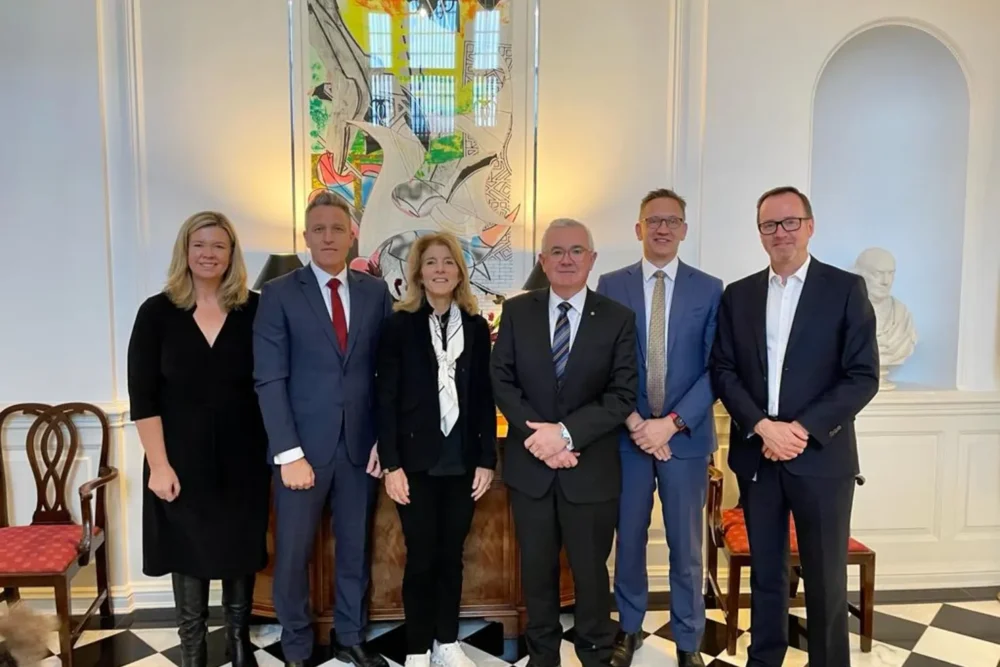Blinken Slams Door on Australian Bid for Assange
The U.S. secretary of state confirmed Australia has lobbied the U.S. to end the WikiLeaks publisher’s prosecution, but said unequivocally that it would continue, reports Joe Lauria.
By Joe Lauria
Special to Consortium News
U.S. Secretary of State Antony Blinken has publicly rebuffed efforts by the Australian government to free WikiLeaks publisher Julian Assange.
Speaking at a press conference with Australian Foreign Minister Penny Wong in Brisbane on Saturday, Blinken said he understood Australians’ concerns about their imprisoned citizen, but took a hard line against any move to end his persecution. Blinken said:
“I really do understand and can certainly confirm what Penny said about the fact that this matter was raised with us, as it has been in the past. And I understand the sensitivities. I understand the concerns and views of Australians. I think it’s very important that our friends here understand our concerns about this matter.
What our Department of Justice has already said repeatedly, publicly, is this: Mr Assange was charged with very serious criminal conduct in the United States in connection with his alleged role in one of the largest compromises of classified information in the history of our country.
The actions that he is alleged to have committed risked very serious harm to our national security, to the benefit of our adversaries, and put named human sources at grave risk of physical harm, grave risk of detention.
So I say that only because just as we understand sensitivities here, it’s important that our friends understand sensitivities in the United States.”
As was shown conclusively by defense witnesses in his September 2020 extradition hearing in London, Assange worked assiduously to redact names of U.S. informants before WikiLeaks publications on Iraq and Afghanistan in 2010. U.S. Gen. Robert Carr testified at the court martial of WikiLeaks‘ source, Chelsea Manning, that no one was harmed by the material’s publication.
Instead, Assange faces 175 years in a U.S. dungeon on charges of violating the Espionage Act, not for stealing U.S. classified material, but for the First Amendment-protected publication of it.
Chapter Closed
Blinken’s remarks effectively close a chapter in Assange’s ordeal that had given hope to his supporters around the world.
Expectations had grown in Australia in May that a deal may have been in the works to liberate him. The hopes began with the clearest statements yet on the case from Australian Prime Minister Anthony Albanese, who said on May 4 for the first time that he had spoken directly to U.S. authorities about Assange; that he wanted the prosecution to end and that he was concerned for his health.
Optimism grew further when five days later, Caroline Kennedy, the U.S. ambassador to Australia and daughter of slain President John F. Kennedy, agreed to meet a group of six, pro-Assange, Australian MPs, from three different parties, plus an independent.

U.S. envoy Caroline Kennedy (third from left) meets a delegation of MPs championing the Assange cause, including Bridget Archer, Josh Wilson, Andrew Wilkie, Julian Hill and David Shoebridge. (U.S. Embassy)
Kennedy, however, presaged Blinken’s comments by telling Australian Broadcasting Corporation Radio last Thursday, when asked if the U.S. would drop the case:
“I met with Parliamentary supporters of Julian Assange and I’ve listened to their concerns and I understand that this has been raised at the highest levels of our government, but it is an ongoing legal case, so the Department of Justice is really in charge but I’m sure that for Julian Assange it means a lot that he has this kind of support but we’re just going to have to wait to see what happens.”
Asked why she met with the parliamentarians at all, she said: “Well, it’s an important issue, it has, as I’ve said, been raised at the highest levels and I wanted to hear directly from them about their concerns to make sure that we all understood where each other was coming from and I thought it was a very useful conversation.”
Asked whether her meeting with the MPs had shifted her thinking on the Assange case, Kennedy said: “Not really.” She added that her “personal thinking isn’t really relevant here.”
A Plea Deal?
Further remarks from Albanese in May that Assange would have to play his part led to speculation that some sort of plea deal for Assange was possible.
On May 22, two days before President Joe Biden was due to visit Australia on a trip he then canceled, Assange lawyer Jennifer Robinson said for the first time on behalf of Assange’s legal team that they would consider a plea deal.
Robinson told the National Press Club in Canberra:
“We are considering all options. The difficulty is our primary position is, of course that the case ought to be dropped. We say no crime has been committed and the facts of the case don’t disclose a crime. So what is it that Julian would be pleading to?”
Labor MP Julian Hill, who met with Kennedy and has been championing such a deal, told Consortium News that he traveled to London earlier this month to visit Assange but that the authorities at Belmarsh Prison refused to let him in, even though the meeting had been pre-arranged.
He told The Sydney Morning Herald last Wednesday:
“The reality is that Australia cannot force the United States to [release Assange], and if they refuse, then no Australian should judge Mr Assange if he chooses to just cut a deal and end this matter.
His health is deteriorating and if the US refuses to do the right thing and drop the charges then no one would think less of him for crossing his fingers and toes, pleading guilty to whatever nonsense he has to and getting the hell out of there.”
But talk of a plea deal has now been seriously dampened if not quashed by Blinken’s hardline remarks. While the U.S. is receiving loyalty from Australia on Washington’s military plans against China, it is offering nothing in return to the Australian government in regards to its citizen, imprisoned for publishing the truth about American war crimes.
Joe Lauria is editor-in-chief of Consortium News and a former U.N. correspondent for The Wall Street Journal, Boston Globe, and numerous other newspapers, including The Montreal Gazette and The Star of Johannesburg. He was an investigative reporter for the Sunday Times of London, a financial reporter for Bloomberg News and began his professional work as a 19-year old stringer for The New York Times. He is the author of two books, A Political Odyssey, with Sen. Mike Gravel, foreword by Daniel Ellsberg; and How I Lost By Hillary Clinton, foreword by Julian Assange. He can be reached at joelauria@consortiumnews.com and followed on Twitter @unjoe
https://consortiumnews.com/2023/07/30/blinken-slams-door-on-australian-bid-for-assange/


0 Comments:
Post a Comment
Subscribe to Post Comments [Atom]
<< Home